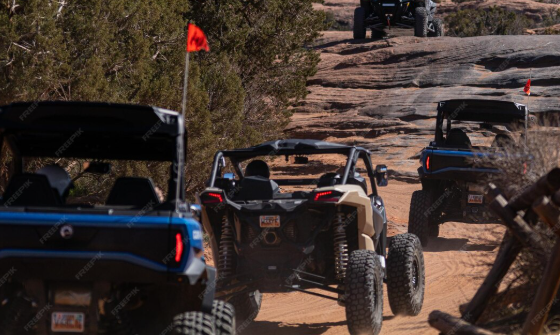Florida is a paradise for off-roaders—sugar-sand trails, pine forests, and year-round riding weather. But before you unload at the trailhead or tow your side-by-side to a weekend adventure, you need a clear grasp of Florida UTV registration requirements. Getting this right protects your wallet, your machine, and your trip plans. And if you’re weighing a different route—such as registering in another state for street-legal access—there are options worth understanding. For readers exploring the Montana path, 1 Dollar Montana offers straightforward information and an easy way to learn about paperwork and setup, so you can focus on the fun instead of the forms.
What Counts as a UTV in Florida
A UTV—utility terrain vehicle, often called a side-by-side—is typically an off-highway machine designed primarily for trails, not paved streets. Think bucket seats or a bench, a steering wheel, seatbelts, and a roll cage. In Florida, these machines commonly fall under broader off-highway vehicle rules. That umbrella includes ATVs, UTVs, and other dirt-focused vehicles.
Why this definition matters
• It determines whether you’re dealing with trail permits, titles, or road-use rules.
• It clarifies what safety gear and equipment standards may apply in various riding areas.
• It affects insurance options and where you’re allowed to ride.
Understanding the category is the first step in decoding Florida UTV registration requirements.
The Core Florida UTV Paperwork: Title, Taxes, and Where You Ride
Title (proof of ownership)
• New machines from Florida dealers typically come with manufacturer documents that you use to apply for a title in your name.
• Private-party or out-of-state purchases also need proper ownership documents and a clean VIN.
• A Florida title makes selling, insuring, and proving ownership easier—and helps if the vehicle is ever stolen.
Taxes and fees
• Expect sales or use-tax considerations, especially for out-of-state purchases brought into Florida.
• Keep bills of sale and purchase documents organized to avoid surprises at the counter.
Where registration fits in
• Many off-highway machines are titled but not “registered” like a passenger car with a plate for open-road use.
• Some public lands require off-highway permits or decals to ride legally. These are separate from a road plate and are a key piece of Florida UTV registration requirements when you plan to use state forests or other designated areas.
Safety and age rules
• Helmets, eye protection, and supervision rules can vary by rider age and location.
• Even when not strictly mandated, safety gear is a smart non-negotiable. Your neck—and your weekend—will thank you.
Step-by-Step: Getting Your Paperwork Ready
While details vary by county and riding venue, this practical flow will keep you aligned with Florida UTV registration requirements:
1) Collect your ownership documents
• Manufacturer’s Statement/Certificate of Origin (MSO/MCO) for new vehicles, or a prior title and bill of sale.
• Any lien information if the vehicle is financed.
2) Apply for a Florida title
• Complete the appropriate title application form.
• Provide ID and ownership documents, and pay title fees and any taxes due.
3) Verify your VIN and keep records tidy
• Ensure the VIN is legible and matches your paperwork.
• File copies of every form you submit. If you ever sell or transfer, you’ll be glad you did.
4) Get the right riding permit for public lands
• Some state forests or managed areas require a separate OHV permit/decals.
• Check the specific trail system’s rules before you haul out; permit windows and availability can be seasonal.
5) Consider insurance (even if not required)
• Comprehensive and theft coverage can save you from a bad day, especially if you store the machine off-site or haul it frequently.
• If you’re participating in events or riding parks, ask about coverage requirements.
Completing those steps puts you on a solid footing with Florida UTV registration requirements and prevents last-minute hiccups that ruin a riding day.
Can You Make a UTV Street-Legal in Florida?
Here’s the candid reality: Florida’s framework is geared toward keeping UTVs off public streets. A small number of local areas may allow limited road crossings or short connectors, but full street-legal conversion is generally not feasible for typical UTVs. That’s because on-road vehicles must meet specific federal and state equipment standards—lighting, crash, and safety requirements—that most factory UTVs aren’t built to satisfy.
What about “low-speed vehicles” and golf carts?
• Those are different categories with their own design, equipment, and speed caps.
• Converting a UTV into a compliant on-road category is rarely realistic, and trying to run a non-compliant vehicle on public roads can lead to tickets, impounds, or worse.
If your riding life involves private land, trail systems, and off-highway parks, staying within Florida UTV registration requirements is straightforward: secure your title, carry your permits where required, and respect local rules.
The Benefits of Registering and Making UTV Street Legal in Montana
If you frequently need light on-road connectivity—fuel runs between trails, moving around small towns near trailheads, or connecting multiple off-highway areas—some riders explore Montana as an alternative pathway to street-legal status. While you must always follow the law where you live and ride, here are commonly cited benefits of Montana’s setup:
• Streamlined path to on-road use for eligible off-highway machines, compared to states that largely prohibit it.
• Broader local drivability in communities that accept properly plated OHVs, making it easier to connect trails, gas stations, cabins, and lodging.
• Clear equipment checklists (e.g., mirrors, lights, horn) that, once met, provide confidence your machine is ready for mixed-use days.
• Travel flexibility: Riders traveling into the Rockies or western states often value the consistency of having a recognized plate and paperwork.
Key reminders
• You must comply with the laws of any state you ride in, including your home state.
• Insurance, taxes, and residency rules still apply; when in doubt, consult a professional.
Curious whether a Montana route aligns with your situation? A great place to start is 1 Dollar Montana. They provide clear information about what’s involved so you can make an informed, lawful choice without wading through guesswork.
Where You Can Ride in Florida: Trails, Forests, and Local Nuance
Florida offers miles of sandy trails, forest roads, and dedicated OHV areas. Your obligations differ depending on the land manager:
State forests and designated OHV areas
• Expect posted rules at trailheads; many require a current OHV permit or day-use pass.
• Machines must be in good repair with sound-level awareness where posted.
Wildlife management areas and private parks
• WMA rules vary, and some areas are closed to motorized use.
• Private parks often have their own waivers and equipment checks.
County roads and connectors
• Some counties allow limited crossings or short connectors.
• Local permission is not universal—always check the county or park you’re headed to.
Keeping a printed or saved copy of your title and any permits is a smart habit and a quiet part of Florida UTV registration requirements savvy owners follow.
Equipment and Safety Essentials That Keep You Rolling
Visibility and control
• Bright, functioning headlights and taillights for dusk rides.
• Reflective elements or flags in open dune areas.
• Good tires for sand and a spare belt if your model uses one.
Protection and comfort
• DOT-rated helmets, proper eye protection, gloves, and over-the-ankle boots.
• A fire extinguisher and a first-aid kit are mounted securely.
• Recovery strap, tire plug kit, and a compact inflator.
Paperwork and peace of mind
• Title or ownership proof, plus your OHV permit where required.
• If insured, keep your ID cards handy.
• A simple maintenance log (oil, filters, belt) helps preserve value and reliability.
These habits aren’t just smart—they support the spirit of Florida UTV registration requirements by keeping riders and trails safe.
Checklist: Documents and Costs You’ll Likely Encounter
Use this prep list to breeze through lines and gatehouses:
Documents
• Ownership proof (MSO/MCO or prior title)
• Bill of sale with VIN, price, and seller details
• Photo ID that matches the buyer
• Lienholder info (if financed)
• Any out-of-state paperwork, if applicable
Fees and payments
• Title fee(s)
• Sales or use tax where owed
• OHV permit or day-use fees for certain trail systems
Saving digital scans of everything (with backups) is a small step that pays off the day you sell or transfer the machine.
Common Mistakes to Avoid
• Assuming your buddy’s county rules are statewide. Local allowances are hyper-specific.
• Confusing a trail permit with a road plate. They’re different—and enforcement treats them differently.
• Forgetting to update ownership promptly. Waiting complicates taxes, liens, and future sales.
• Showing up without proof. Keep digital and paper copies of your title and permits.
• Neglecting equipment basics. A burned-out taillight can end a twilight ride fast.
Learning from others’ mistakes is an underrated part of following Florida UTV registration requirements.
FAQs About Florida UTV Registration Requirements
Do I need a license plate for a UTV in Florida?
Most UTVs used off-highway do not receive standard passenger plates. Instead, you’ll focus on title/ownership and any trail-system permits that apply.
Can I legally drive my UTV on public streets?
Generally, no. Florida treats UTVs as off-highway machines. A few local exceptions allow short connectors or crossings, but broad street use isn’t the norm.
What about converting to a “low-speed vehicle”?
That’s a different category with distinct design and compliance standards. Most UTVs are not built to meet those standards.
Do I still need permits on private land?
That depends on the landowner or park. Many private parks require waivers and sometimes specific safety gear.
Will insurance lower my risk even off-road?
Yes—especially for theft, trailer incidents, and event requirements. Ask your carrier about OHV coverage.
These answers won’t replace local rules, but they give you the framework to apply Florida UTV registration requirements correctly.
Putting It All Together: A Confident, Compliant Riding Plan
When you strip away the jargon, Florida UTV registration requirements come down to three pillars: prove ownership (title), respect where you ride (permits and local rules), and prepare your machine (equipment and safety). If you need full street-legal flexibility that Florida rarely offers for UTVs, exploring Montana’s framework may align better with your riding style—especially for connecting small-town roads around trail systems. If you’re considering that route and want a simple, practical starting point, check out 1 Dollar Montana. You’ll find clear explanations about paperwork and options so you can make a well-informed, lawful decision—without derailing your next ride weekend.
Stay in touch to get more updates & alerts on Baddieshub! Thank you




